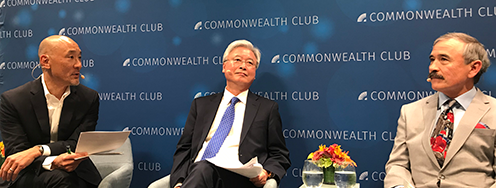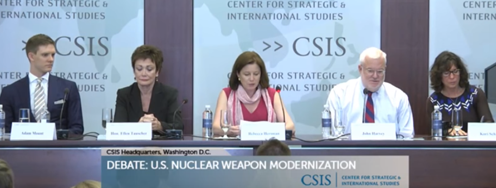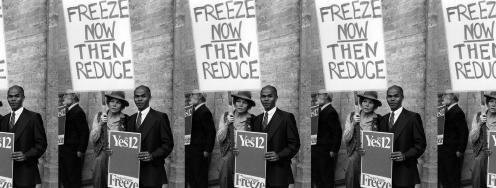A Tale of Two Viewpoints
The NPT conference, as any reader of this blog knows, is going better than most experts expected. The conference, however, is a minor issue in Washington, where debate remains focused on the New START treaty, missile defense and Iran. The Washington debate highlights the deep divide between progressives and far-right conservatives on the relationship between existing nuclear arsenals and the spread of these weapons to other nations.
For the far-right, nuclear weapons are power we would be foolish to give up. “The US nuclear arsenal is as important as it ever was,” says analyst Keith Payne, whose 1980 article, “Victory Is Possible,” argued for fighting and winning a nuclear war. If we decrease our arsenals, says former US Ambassador to the United Nations John Bolton, “Teheran and Pyongyang will conclude that…America is getting weaker.” In this view, these are weapons the United States must retain indefinitely and prepare to use.
For progressives, whatever benefits nuclear weapons may have provided in the past are now outweighed by the risks they present. The Nuclear Posture Review released by the Obama Administration April 6 concludes that the greatest threats to America, are nuclear terrorism and new nuclear-armed states. To prevent both, we need the cooperation of many other nations. To get that cooperation, we must move together with them to reduce and eventually eliminate all nuclear weapons everywhere. “Clinging to nuclear weapons in excess of our security needs,” says Secretary of State Hillary Clinton, “gives other countries the motivation or the excuse to pursue their own nuclear options.”
The two views inform how both camps view the NPT Review Conference. For the far-right, it is an empty talk fest, where the global Lilliputians gang up on the American Gulliver. For the Obama administration, it is an essential part of a comprehensive plan to protect America.
Five years ago, the former view informed the US role in the last conference, contributing to its failure. This year, while the United States and other nuclear-weapon states have not escaped criticism for the relatively slow pace of nuclear reductions, the new nuclear security agenda forged by the administration has won the praise of most nations. Agreement is developing among key nations for new steps to accelerate disarmament and build firmer barriers to any new state getting nuclear weapons.
If this agreement consolidates, it will be seen my many as a validation not just of the administration strategy but of the new bi-partisan consensus upon which it is based.
I have used the phrase “far-right conservatives” above because many conservatives are part of this consensus. It is epitomized by the work of George Shultz, Henry Kissinger, Bill Perry and Sam Nunn who argue now for “a world free of nuclear weapons.” In their January 2007 Wall Street Journal op-ed they wrote, “We face a very real possibility that the deadliest weapons ever invented could fall into dangerous hands.” The only way to prevent this, they argue, is to move step-by-step to eliminate all nuclear weapons.
This consensus is growing. Two-thirds of the former secretaries of defense and state and national security advisors have endorsed their overall strategy. Dozens of groups in many nations are working on plans for how to do it. The administration has embraced the policies in its new nuclear plans, reducing the role and number of nuclear weapons in US strategy, the New START treaty with Russia now awaiting Senate approval, and the Nuclear Security Summit held in Washington last month where 47 nations agreed to an action plan to prevent nuclear terrorism.
That is why Henry Kissinger, George Shultz, former Secreatary of State Jim Baker and former National Security Advisor Brent Scowcroft all endorse the New START treaty and most elements of the new security agenda. This still does not assuage the far-right, who will dismiss whatever happens in the Review Conference as pointless or as a weakness. It is vital that international observers understand that these views — however loudly expressed — represent a minority within a minority view. The majority of national security experts in the United States will see the Conference and the New Start treaty as progress and solid evidence that the new nuclear security agenda is working.



